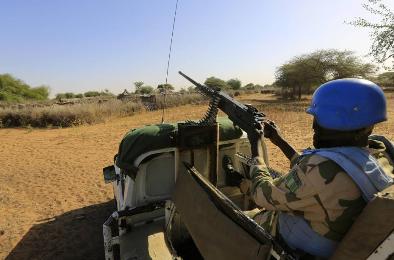Rebels reiterate calls for holistic approach to Sudan conflicts
December 12, 2013 (KHARTOUM) – Two rebel groups fighting against the Sudanese army in Darfur reaffirmed their commitment to reach a peaceful settlement for the 10-year conflict but said it should be comprehensive and inclusive.

The Justice and Equality Movement (JEM) led by Gibril Ibrahim and the Sudan Liberation Movement faction led by Arko Minni Minawi (SLM-MM) concluded on Wednesday a workshop with the joint chief mediator Mohamed Ibn Chmbas held in Addis Ababa from 9 to 11 December.
The technical meeting aimed to explore ways to bring the non-signatory groups to the negotiating table with the Sudanese government as they refuse to join the Doha Document for Peace in Darfur (DDPD).
In a statement released on Wednesday evening, the two rebel groups reiterated their demand for a “comprehensive, inclusive, just and sustainable negotiated peaceful settlement of the Sudanese conflicts”.
They further asked to unify the peace tracks, and to gather all the parties around one negotiating table.
JEM, SLM-MM, SLM-Abdel Wahid, and SPLM-N are members of the rebel alliance Sudanese Revolutionary Front (SRF) which demands to hold a comprehensive process aiming to dismantle the regime of president Omer Al-Bashir and to establish a democratic and secular state in Sudan.
Abdel Wahid Al-Nur who refused to take part in the consultations organised by the joint mediator says he is only ready to join a comprehensive process.
He told Sudan Tribune on Tuesday that Khartoum would never accept the holistic approach, and called to put pressure on the Sudanese regime to accept democratic change.
Reached by telephone JEM secretary for presidential affairs, Mansour Arbab, told Sudan Tribune from Addis Ababa that the three-day meeting allowed them to make a breakthrough with the African Union and the IGAD as well as with the joint mediator.
“They have better understanding for our positions”, Arbab said adding that their delegations “have successfully corrected the unilateral vision” the African officials had on the conflict.
He further said they cannot decide to engage peace talks without prior consultations with their rebel allies on issues of peace and war, underscoring SPLM-N deputy leader is the commander in chief of the SRF troops.
The rebel official also said the African Union representative in the meeting pledged to organise a meeting between them and the Chairperson of the African Union Commission, Nkosazana Dlamini-Zuma.
The Sudanese rebels complain that the African Union refuses to listen to their point of view and takes its decision based on the position of the Sudanese government.
According to the joint statement, the two rebel groups committed themselves to facilitate the flow of humanitarian assistance to the affected civilians in the rebel controlled areas and expressed their readiness to “facilitate the role of UNAMID to carry-out its mandate and protect civilians in war affected areas”.
They however urged the international community to put pressure on Khartoum army to stop its air attacks and called to establish a no-fly zone.
African sources close to the consultations however told Sudan Tribune that the rebels brushed aside a proposal made by the joint mediator aiming to declare a humanitarian cessation of hostilities and to get a commitment from the rebels to engage direct with Khartoum, as it was demanded by the AU Peace and security Council.
The rebel statement did not mention a follow-up meeting in the upcoming period but the joint mediator is expected to keep in touch with the rebel groups, as African observers say a confidence building process between the mediator and the rebels is needed to persuade them to join the negotiating table.
The African Union agrees with rebel groups on the constitutional reforms but it says democratic reform can intervene following the conclusions of two separate peace agreements negotiated with the rebel groups in Darfur from one side and the Blue Nile and South Kordofan from the other side.
The rebels’ demand for a comprehensive process also seems have two versions said an African Union official how preferred anonymity.
He pointed that, in accordance with the 28 June 2011 framework agreement negotiated with the SPLM, the two parties agree to conclude a political partnership and consequently they will work to achieve democratic transformation in the country. While the other version of the SRF rebels, he underlines, implies a regime change.
He added that joint mediator can exert efforts to reconcile the two perceptions of the comprehensive peace process and bring Darfur rebels to negotiate on the same basis of 28 June agreement. He however said this step requires a green light from Khartoum.
The Sudanese government says Darfur rebel groups have to negotiate on the basis of the DDRD.
The joint chief mediator is expected to hold a press conference on Thursday.
(ST)
